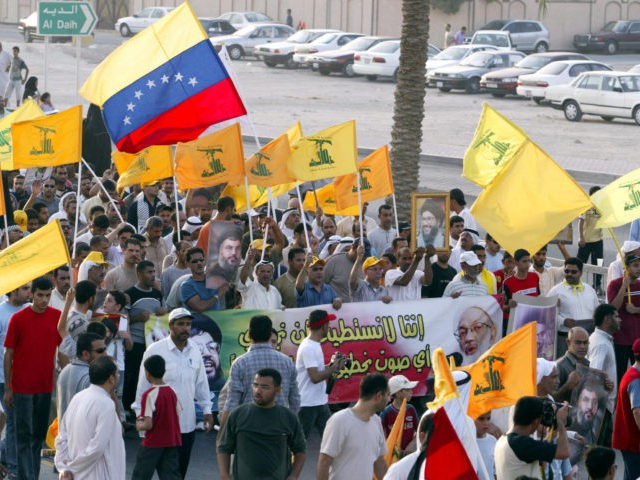An anonymous hacker collective revealed the names of alleged Hezbollah terrorists living in Venezuela on Tuesday, accusing them of profiting from drug and human trafficking there after arriving as “students.”
The unnamed hackers told Israel Hayom that they had received help from defecting former socialist officials to access secret files belonging to the regime’s Directorate General of Military Counterintelligence (DGCIM). The agency, they alleged, kept a database of Hezbollah terrorists who had entered the Latin American country under the auspices of a “government language studies program,” many of them residing on tropical Margarita Island. The hackers go by the name “HDP,” the Israeli newspaper reported.
Late socialist dictator Hugo Chávez prioritized building close ties to Iran, Hezbollah’s state sponsor, during his regime. Current dictator Nicolás Maduro has maintained the tradition, relying on Iran on everything from running luxury supermarkets for the socialist elite to importing gasoline, a necessity in the nation with the world’s second-largest oil reserves due to socialist incompetence. In exchange for the support, the socialist elite bow to Iran’s regime, honoring terrorist leaders like dead Islamic Revolutionary Guard Corps (IRGC) Qassem Soleimani.
Hezbollah, a Shiite terrorist organization officially run out of Lebanon but with close ties to Iran, has also reportedly maintained significant operations in Venezuela with the Maduro regime’s help. One of Maduro’s top ministers, Oil Minister Tareck El Aissami, is reportedly one of Hezbollah’s most important Latin America fundraisers; the U.S. government is offering $10 million for information leading to his arrest.
Multiple whistleblowers have revealed in recent years that the Maduro regime has illicitly provided authentic Venezuelan passports to thousands of Middle Eastern citizens with no ties to the country, including suspected members of Hezbollah.
According to Israel Hayom, the HDP hackers believe the listed Hezbollah members in the regime database are “involved in arms and drug trafficking as well as money laundering to finance terror.” Several of them are related. Three of those listed – Jalal Maklad, Rabi Maklad, and Majdi Maklad – belong to the same family and live on Margarita Island. The hackers claimed the men were involved in cocaine trafficking and human trafficking.
“The Maklad Family has lived there for four generations, but the ties to Hezbollah were forged not long ago,” an anonymous source unrelated to HDP told Israel Hayom, alleging they were on Margarita Island and knew some of the men listed personally. The family, the source claimed, has “direct ties” to El Aissami, the oil minister.
“Tareck El Aissami is one of Hezbollah’s great bagmen, a sort of huge funder,” Latin America terror expert Dr. Vanessa Neumann told Breitbart News in 2018. “The money goes through the networks, and then, as you say, that money comes back through investments.”
Joseph Humire, another terrorism expert and the executive director of the Secure Free Society (SFS), confirmed to Breitbart News on that occasion that El Aissami had a relationship with Hezbollah and was “protected to some degree” by the terrorist organization, though no evidence suggested that his relationship extended into planning any terrorist attacks.
The U.S. government accuses El Aissami of helping fundraise for the regime and its allies through “shipments of narcotics from Venezuela.”
“In his previous positions, he oversaw or partially owned narcotics shipments of more than 1,000 kilograms from Venezuela on multiple occasions, including those with the final destinations of Mexico and the United States,” according to U.S. Immigration and Customs Enforcement (ICE).
A study published by the Atlantic Council last year found that Hezbollah “operates through compartmentalized, familial clan structures that embed into the Maduro regime-controlled illicit economy and the regime’s political apparatus and bureaucracy.” Those “clan structures” are the product of generations of immigration out of Lebanon and Syria into Venezuela throughout the 20th century; El Aissami is Lebanese-Venezuelan, as are several of the regime’s top henchmen.
Almost among those in the Lebanese diaspora is Alex Saab, a Colombian national arrested in Cape Verde on American law enforcement charges of extensive money laundering. Cape Verde extradited Saab to the U.S. this month; Cape Verde authorities arrested Saab midway through a trip to Iran. The U.S. accuses Saab of laundering $350 million, much of it for the Maduro regime and its allies. Reports suggest some of that money ended up in Hezbollah hands.
Chavista fanatics have dubbed Saab the “Oskar Schindler” of Venezuela for helping the Maduro regime.
In addition to Hezbollah attempting to exploit the presence of Shiite Muslims in the region already, extensive reporting in the past half-decade suggests that the terrorist organization imported hundreds of operatives with the use of authentic, but unjustified, Venezuelan passports distributed to its Middle Eastern members. Spanish journalist Emili J. Blasco revealed in 2015 that Maduro held a meeting with the leader of Hezbollah, Hassan Nasrallah, that resulted in an agreement to sell the group passports in 2007. Two years later, Colonel Vladimir Medrano Rengifo, the former head of the agency responsible for issuing Venezuelan passports, revealed that his office printed at least 10,000 passports for people from Syria, Iran, and Lebanon, among other Mideast nations, that had no ties to Venezuela.
The Panama Papers, a treasure trove of documents belonging to now-defunct international law firm Mossack Fonseca, revealed in 2016 that the communist regime in Cuba bankrolled the Venezuelan passport scheme.

COMMENTS
Please let us know if you're having issues with commenting.